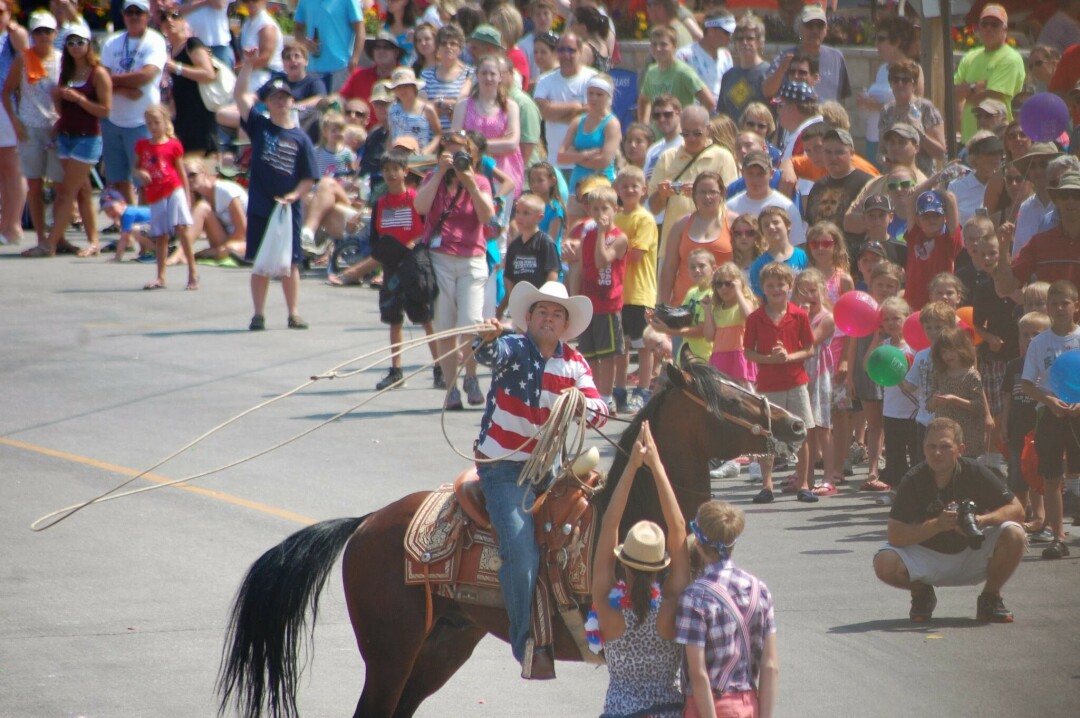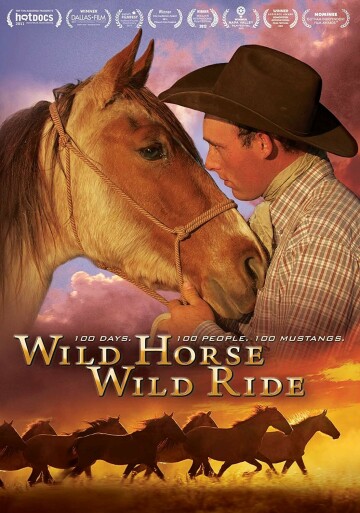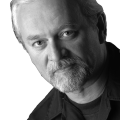News & Articles
Browse all content by date.

Jesus “Chewy” Jauregi and his family are always stars of parades in Door County as they ride and rope clusters of willing people. Photo by Jim Lundstrom.
Nineteen minutes into the documentary Wild Horse, Wild Ride, the screen is filled with a magnificent summer blue sky marbled with cauliflower-like cumulus clouds and the words “Door County, Wisconsin” pop onto the screen.
Then we see Jesus “Chewy” Jauregui for the first time at his 20-acre ranch on County A in the middle of the Door Peninsula, with his wild mustang, El Comprade. As he says to the horse, “small circles,” the words “Jesus and Comprade” pop up on the screen, and then as the horse turns in small circles, the words “Day 8” pop up, and we suddenly realize we are watching magic. Eight days in with a previously wild mustang that didn’t know humans from Adam, and already there is an obvious connection between man and horse.
“The key, patience,” Chewy says in voiceover as we see him work with El Comprade. “It’s like a gift, a gift from God. He’s a smart horse. He’s doing good. I’m happy he responds to me. I want to see he’s happy, too.”
Chewy and other members of his family are famous for riding beautiful horses and performing rope tricks during Door County parades. In addition to riding horses, Chewy trains mustangs.
The premise of Wild Horse, Wild Ride is to show a variety of trainers from around the country who are given a wild mustang to train in 100 days before competing in the Extreme Mustang Makeover put on by the Mustang Heritage Foundation.
Chewy was one of eight trainers that filmmakers Alex Dawson and Greg Gricus decided to focus on for their beautiful documentary about the mustang challenge.
The film documents the 2009 Extreme Mustang Makeover. Four years later, sitting in a large barn on Chewy’s property, he is asked how he came to be featured in the film.
Chewy is pretty sure it happened because the organizers of the challenge recognized his horse skills, but also appreciated his manner. The night before the three-day challenge began, Patti Colbert, founder of the Extreme Mustang Makeover and executive director of the Mustang Heritage Foundation, explained the rules and told the competitors not to argue with the judges.
“The lady was really clear,” Chewy said. “She said, ‘If you guys have some questions, come talk to me.’”
Sure enough, the next day one of the competitors started arguing with a judge.
“I just walked over and told the guy, ‘You remember last night about the meeting? Whatever the judges give you, that’s it. You don’t have to be crying or say ‘Why?’ One of the ladies saw me. That girl was really impressed at the way I think and told him. They appreciated a lot what I say. They pick me from Wisconsin because they say they can tell I have good control.”

And then he adds, “Maybe I’m lucky.”
But filmmaker Alex Dawson says it was much more than being lucky.
“In June 2009, as we got close to shooting, we had already selected eight of the trainers that we were going to be featuring in the film. We thought we had a great range of trainers and that film’s cast of characters was complete,” she said. “But on a call with the Mustang Heritage Foundation, I asked if there were any trainers that maybe we should feature that we had yet to contact. They responded by saying that we had a great selection and they weren’t sure if we could add someone, however, there was a trainer up in Door County, Wisconsin, whom they adored. They described Jesus as a wonderful soul with a true gift for working with horses and as someone who trained and rode in the Vaquero tradition, which was different from anything else we were featuring. When we called Chewy, we immediately had a sense that we had to involve him in the film.
“Greg (my husband and co-director) went to do the first shoot with Chewy solo. He called me from Baileys Harbor and said, ‘I’ve just met the star of our film.’ And, indeed, Chewy truly turned out to be. He and Compadre formed a magical, almost mystical connection, and watching their relationship blossom was both thrilling and heartwarming for us and I think, ultimately, the audience, too. People who have seen the film are always telling me how moved they were by Jesus and asking what’s next for him. He is an amazing man with an incredible gift for horse training.”
Spoiler Alert: If you haven’t seen Wild Horse, Wild Ride yet, you may want to skip the next few paragraphs.
Chewy and El Compadre made it into the top 10 in the challenge, but finished 9th overall.
“It was really tough,” Chewy said of the competition. “Number one, I’m happy. I got a wild horse, trained the horse and brought him to the competition. You are winning already to bring the horse so far.”
He had hoped to win Comprade at auction, but billionaire T. Boone Pickens and his wife, Madeline, a big supporter of the Mustang Foundation, got in on the bidding. The Pickens’ won with a $9,000 bid, about four times what other horses went for. They donated Comprade to T. Boone’s alma mater, Southern Methodist University (SMU), home of the Mustangs.
“I’m going to keep the horse in my heart. Comprades for life,” Chewy says in the movie.
He was, however, asked to present Comprade to SMU in an Oct. 17, 2009, ceremony before a SMU-Navy football game, and that, Chewy said, became the most emotional moment he had with Comprade. The organizers of the event asked Chewy if he could make Comprade bow after they played Michael Martin Murphy’s 1975 hit song “Wildfire.”
“The most great time the horse give me, the most emotional time for me, when the song is done, my horse bowed. The people was impressed,” he said.
Chewy trained his first wild mustang in 2008, and has trained at least one every year since. He currently is working with two mustangs who are already putty in his capable hands.
“Lots of people train horses looking for money or fame. They try to be famous. When I started doing these horses, I did from my heart,” he said. “If you are honest with yourself, you will be honest with your horse.”
Chewy grew up around horses on his family’s ranch in Mexico.
“We come from a large horse family. Horses are in our blood,” he said. “We’ve been in a lot of competitions in Mexico. Most people like to enjoy different sports or hobbies. Our hobby is horses.”
But in 1993, he and his three brothers left Mexico to find work in Door County.
“We always want to do something different,” he said. “We come looking for work, to get better opportunities like everybody. Try to have a good life. Everybody has a dream. Sometimes it’s really hard to find it.”
In 1999 Chewy and his brother Teo started their own roofing company and made Door County their year-round home. Suddenly, Chewy had no contact with horses. All he did was work.
“At one time I was getting stressed over work,” he said. “They told me I had to go to the hospital emergency room. I thought I had a tumor or something in my brain. They find out I have too much stress, too much work. After that, I decided to buy a horse. I buy my first horse in 2001. Horses have been used for rehabilitation for people. That is why I buy the horse, to have a better day. I had a horse to do something I enjoy. We know how to take care of horses and we know the good feeling it can give you.”
But he soon found that boarding a horse is expensive, so he and his brothers decided to buy the 20 acres on County A.
“I’ve been building this place since 2005, little by little,” he said.
“I have a good group of my own, three horses that are my master horses,” he said. “I call master horses because you just get on and go for a ride or you just get on and do a horse demo, or rope some cows. A good horse you don’t have to warm it up. You get in the saddle and go do your job, any situation. Just jump and go.”
His technique in training a horse is all about communication.
“I’m looking to have a good moment and good mental bond. The techniques I use, they become gentle or domesticated quicker. If you try to be macho or tough, it’s worse. You have to earn that trust. The horse gives communication. Read the horses first. Each horse you meet is like you meet a different person. Sometimes you get really a good bond or sometimes you have to ask a lot more to be accepted. It’s not easy. Each one has some personality and you have to work that horse to come your way.”
Chewy said working with a horse isn’t much different from working with people.
“A happy human makes a happy horse. Horses love to do some work. Teach it something different. You and the horse have to learn together. You have to have your mind set up, planning ahead.
A horse trainer always believes in imagination. Use your imagination. It is the best way I find to train horses. Each one is a different challenge, different personality, with a way they like to do things. Sometimes it takes a little longer to understand. Always you need to make clear what you are looking for.
“If you are rude to people, they will say, I don’t like that guy. If you try to use three words – I learned this from an old guy – you say three words, they open the door so easy: please, thank you and excuse me. Three words to open huge doors, but you have to use it at the right moment. Same thing with horses.
“First you have to ask in a good way. First you have to give it an invitation. They answer with an eye or look. They give you a good look, not mean. Then you ask if it can do something for me, they will do. But you have to have a good way to ask it. Horses are really sensitive. If you try to be too strong, horses, they get heavy. It’s going to be a little bit of an argument. They have their own minds. But if you find a good way to ask things, it will be a little more smooth.”
Since Wild Horse, Wild Ride hit first the film festival circuit and then the home video market, Chewy has heard from people who want him to train their horses.
“It’s been a really great opportunity. I have people call me from all over the country to say it’s a great job,” he said.
“We love Chewy,” said Kim Dorner, who watched from the sidelines with husband Brian as their 16-year-old daughter, Courtney, attended a summer horsemanship clinic at Chewy’s ranch.
The family from Luxemburg, Wisconsin, heard about Chewy’s skill with horses after Courtney was bucked from her horse at the 2012 Kewaunee County Fair.
“He’s got attitude and stuff,” Kim said of her daughter’s horse. “After that, she did not ride him.”
Or at least not until February when the family and horse began visiting Chewy for a series of training sessions.
“Chewy improved her technique and helped her understand the horse,” Kim said. “Using a gentle hand, he taught her how to read the horse – its ears, its eyes, its tail. Now Courtney is much more confident.”
Chewy’s training has not only improved Courtney’s horsemanship, she says her horse is not the same one that bucked her at last year’s fair.
“He’s more calm and he responds better,” she said. “I really enjoy coming here. I learn a lot.”
Chewy’s vision is to one day concentrate all his energy on a horsemanship school at his ranch.
The Jauregui family is well-known to peninsula parade-goers. Cheers always greet the family decked out in cowboy gear as they ride their proud horses through the streets of whichever community is celebrating with a parade, especially since the tradition of roping people in the crowd began a few years ago.
“We started going to the parades and I was doing my trick roping,” Chewy said. “Now I don’t have time to do tricks because people want to be roped.”
He said the people-roping began “when a guy said, ‘You can rope me! You can rope me!’ He tried to run like a bull. And chuckled when I roped him. That is the way we started roping people.”
Now whole families or large groups of children run into the street, asking to be roped by the Jaugeruis.
“A lot of kids know our names already,” Chewy said in astonishment. “I feel great when kids scream my name, ‘Hey, Chewy! Rope me!’”
He pauses, then wonders aloud, “How do they know my name?”
There’s only one answer: You’re a star, Chewy.
Wild Horse, Wild Rise is available on Amazon Prime.
| Tweet |


